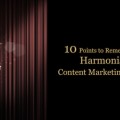Working with Bloggers to Make Your Brand Memorable: Should You Pay for Reviews?
 Having your own blog is obviously of paramount importance for making your brand memorable in the digital world. How about partnerships? Should you look for famous bloggers willing to endorse your products? Should you pay for such services?
Having your own blog is obviously of paramount importance for making your brand memorable in the digital world. How about partnerships? Should you look for famous bloggers willing to endorse your products? Should you pay for such services?
Did you know that almost 70 per cent of internet users prefer to learn about products and services through content rather than through advertising? There’s a problem, however. More than 2.73 million blog posts are published every single day. In this content deluge, readers can easily lose focus and miss your interesting posts.
Sponsoring a post or asking for a paid publication in a blog that has a large, targeted audience is one of the best options for overcoming the problem and reaching prospects. According to 2013 statistics, brands spent 6.7 per cent of their budgets on sponsored blog posts. The figure has probably increased since then. Advertorials, sponsored articles and product reviews written by some of the most reputable bloggers will have an overwhelmingly positive impact on your brand.
So, what does it take to identify the right bloggers and establish solid, mutually-beneficial partnerships? The following guide will acquaint you with the main rules and give you a few secrets for more meaningful interactions with bloggers that produce higher conversion rates.
Rule 1: Useful Content, Not Promotion
Resist the temptation to pay a famous blogger for a positive product review. Such advertorial texts are very easy to recognise and today’s audience isn’t dumb!
Sending bloggers products that they can test and review on their own is the best possible idea. Choose niche bloggers that usually write about the industry you’re active in. If you send organic cosmetics, for example, you can identify bloggers that write about healthy living, beauty and nature preservation.
Give these bloggers an opportunity to try your best items and write honest reviews about those. If you’re confident in the quality of the products, you have no reason to worry.
Such reviews sound natural and honest. They’re much more trustworthy than a forced positive testimonial. Paying for a positive review will do very little for your online reputation. In fact, that approach could be detrimental.
Rule 2: Sponsored Content is Acceptable on Occasions
Apart from giving famous bloggers an opportunity to test and review your products, you should also think about sponsored content.
Most famous blogs have an opportunity for sponsored editorials to be published against a certain payment. The terms and conditions will usually be presented on the website.
According to Fortune magazine, sponsored content can be considered the “holy grail” of inbound promotion. Even big publications like Wall Street Journal, Forbes, The New York Times and The Atlantic publish articles and videos that are sponsored by brands. People are falling out of love with native ads, which is why a more creative approach is called for.
Sponsored content is clearly labelled as such. Though some people will respond negatively to an article that is influenced by a certain brand, the vast majority will go through the text. It appears on a favourite blog, thus chances are that people will pay attention. As more and more digital media embrace the opportunity, sponsored content is expected to become even more paramount for the execution of inbound campaigns.
The trick, once again, is to find the right blogs. The topics that these cover, the audience profile and the traffic are all essential. Demand such data from bloggers before agreeing to any kind of partnership.
Rule 3: Make Your Content Relevant
Once you find the blogs where you’d like to have your content published, spend some time exploring the posts and learning something about the audience. Both of these will be of paramount importance for making your content relevant, thus boosting the effectiveness of your branding efforts.
Even if you choose the right blog that has serious, targeted traffic, you’ll still fail converting if you don’t put a bit of effort in making your content fun. When it comes to using text for branding purposes, follow these simple steps:
-
Do a bit of research to see what others have written about and which topics tend to generate a lot of buzz.
-
Stay away from generic pieces that people can find in hundreds of blogs and websites.
-
Use your expertise to write something niche and informative. It can be a how-to guide, an industry news piece or anything else that the audience will find engaging or informative. A bit of humour wouldn’t hurt, either.
-
Social media can also be helpful for doing research, seeing what topics are trending and what people like to read abut.
-
Keep your brand out of the content as much as possible. Otherwise, people may perceive your text as spam. If you put an informative and interesting text together, people will be willing to learn more about the brand itself.
-
Newsworthy pieces are particularly hot, especially if you are active in a dynamic field.
-
Talk to the blogger about good topic ideas, follow their editorial guidelines and put some effort in boosting the quality of the text.
Sponsored content and partnerships with bloggers will work if you choose the right places to publish your content. When it comes to branding through the use of sponsored texts or reviews, QUALITY is much more important than QUANTITY. Do your research, narrow it down to a few potential partners and nurture those relationships. They can be particularly beneficial in the long run.
Good Luck!




